

Student Essay on Shakespeare Essay: It Is Not a Tragedy Unless You Have a Long Way to Fall. Summary: The theme of fear within Macbeth and King Lear ties the plays together and links them into the same category.

Fear within Macbeth is another motivation that drives so many of the characters actions. For Macbeth, his fear of the prophecies is his driving action. Macbeth fears the prophecies that he will be king because it calls for him to act. Shakespeare Essay: It's Not a Tragedy Unless You Have a Long Way to. Tragedy of Macbeth Quotes. Macbeth: Quotes and Essay Questions. Quotes & Possible Essay Questions for Macbeth Quotations: 1.

"Fair is foul and foul is fair . . . " (Witches 1.1) 2. 3. 4. 5. 6. 7. 8. 9. 10. 11. Macbeth: Plot Overview. The play begins with the brief appearance of a trio of witches and then moves to a military camp, where the Scottish King Duncan hears the news that his generals, Macbeth and Banquo, have defeated two separate invading armies—one from Ireland, led by the rebel Macdonwald, and one from Norway.
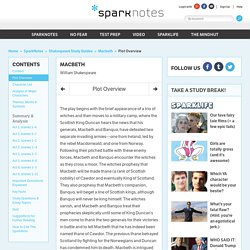
Following their pitched battle with these enemy forces, Macbeth and Banquo encounter the witches as they cross a moor. The witches prophesy that Macbeth will be made thane (a rank of Scottish nobility) of Cawdor and eventually King of Scotland. They also prophesy that Macbeth’s companion, Banquo, will beget a line of Scottish kings, although Banquo will never be king himself.
The witches vanish, and Macbeth and Banquo treat their prophecies skeptically until some of King Duncan’s men come to thank the two generals for their victories in battle and to tell Macbeth that he has indeed been named thane of Cawdor. Lady Macbeth suffers none of her husband’s uncertainty. Macbeth: Key Facts. Macbeth: Study Questions & Essay Topics. Study Questions.
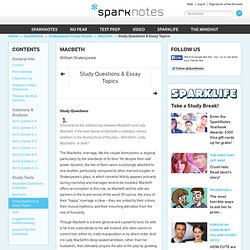
MacBeth - Tragic Hero. Macbeth Study Guide - William Shakespeare. On a lonely heath in Scotland, three weird witches sing their riddling runes and say that soon they will meet Macbeth.
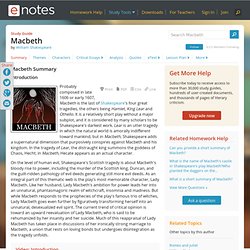
Macbeth, the noble thane of Glamis, had recently been victorious in a great battle against Vikings and Scottish rebels. For his brave deeds, King Duncan decides to confer upon him the lands of the rebellious thane of Cawdor. On his way to see the king, Macbeth and his friend, Banquo, meet the three witches on the dark moor. The wild and frightful women greet Macbeth by first calling him thane of Glamis, then thane of Cawdor, and finally, king of Scotland. Finally, they prophesy that Banquo’s heirs will reign in Scotland in years to come. Macbeth thinks very little about the strange prophecy until he meets one of Duncan’s messengers, who tells him that he is now thane of Cawdor.
Shakespearean tragedy. Lady Macbeth. According to some genealogists, Lady Macbeth and King Duncan's wife were sisters or cousins, where Duncan's wife had a stronger claim to the throne than Lady Macbeth.
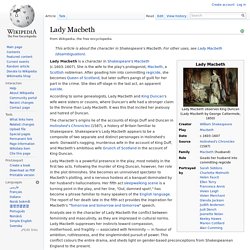
It was this that incited her jealousy and hatred of Duncan. The character's origins lie of the accounts of Kings Duff and Duncan in Holinshed's Chronicles (1587), a history of Britain familiar to Shakespeare. Banquo. Source[edit] Macbeth and Banquo meeting the witches in a woodcut from Holinshed's Chronicles Shakespeare often used Raphael Holinshed's Chronicles of England, Scotland, and Ireland—commonly known as Holinshed's Chronicles—as a source for his plays, and in Macbeth he borrows from several of the tales in that work.[1] Holinshed portrays Banquo as an historical figure: he is an accomplice in Mac Bethad mac Findlaích's (Macbeth's) murder of Donnchad mac Crínáin (King Duncan) and plays an important part in ensuring that Macbeth, not Máel Coluim mac Donnchada (Malcolm), takes the throne in the coup that follows.[2] Holinshed in turn used an earlier work, the Scotorum Historiae (1526–7) by Hector Boece, as his source.
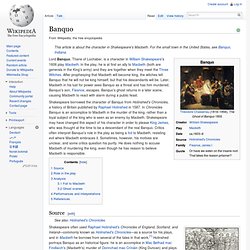
Boece's work is the first known record of Banquo and his son Fleance; and scholars such as David Bevington generally consider them fictional characters invented by Boece. Role in the play[edit] Banquo is in a third of the play's scenes, as both a human and a ghost. Analysis[edit] The Tragedy of Macbeth: Plot Summary Acts 3, 4, and 5. Macbeth: Plot Summary (Acts 3, 4 and 5) Act 3, Scene 1 The act opens at the royal castle on the day of a great feast to celebrate Macbeth's coronation.
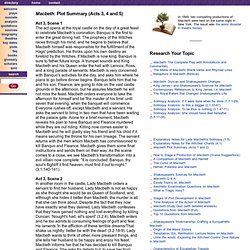
Banquo is the first to enter the great dining hall. The prophecy of the Witches races through his mind, and he begins to believe that Macbeth himself was responsible for the fulfillment of the Hags' prediction. He thinks upon his own destiny as foretold by the Witches. If Macbeth is now king, Banquo is sure to father future kings. Act 3, Scene 2 In another room in the castle, Lady Macbeth orders a servant to find her husband. Act 3, Scene 3 The two murderers set out to find Banquo and Fleance, riding on the palace grounds. The Tragedy of Macbeth: Plot Summary. Macbeth: Plot Summary (Acts 1 and 2) Act 1, Scene 1 Amidst thunder and lightning, three witches meet to plan their encounter with Macbeth, a Scottish general and the Thane of Glamis.
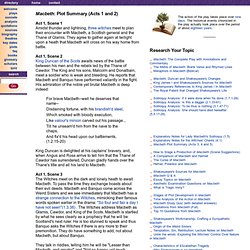
They agree to gather again at twilight upon a heath that Macbeth will cross on his way home from battle.